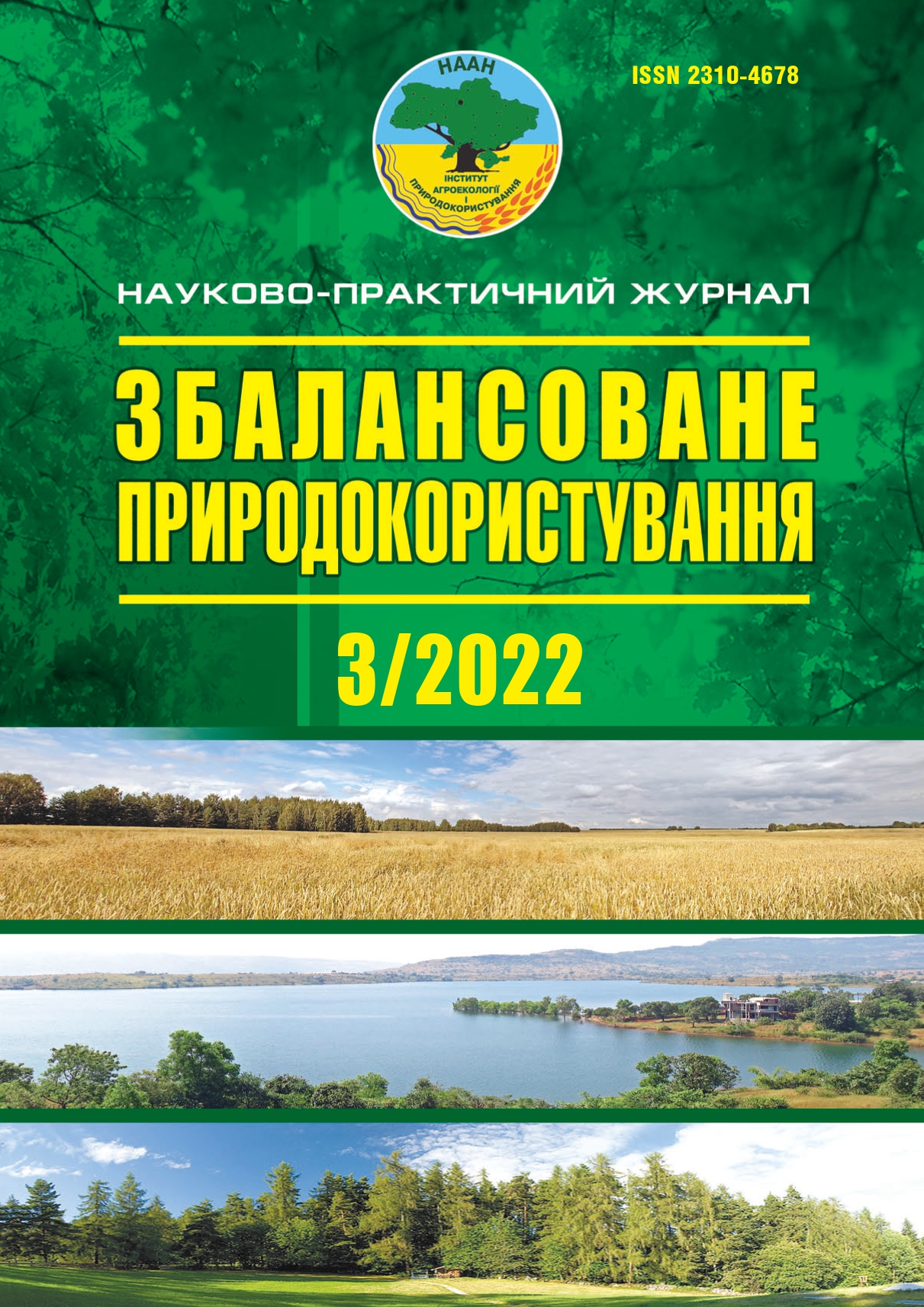Socio-economic and regulatory aspects of enviromental management based on the current standards of the Constitution of Ukraine
DOI:
https://doi.org/10.33730/2310-4678.3.2022.266556Keywords:
the fundamental law of Ukraine, land and its natural resources, cognitive land economy, nature management, agrosphere, systemAbstract
The analysis and synthesis of ecological, socio-economic and normative-legal aspects as factors of objectivity and subjectivity of land-nature use, which are based on the laws of animate and inanimate nature and society and are fully consistent with the current norms of the Constitution of Ukraine, have been carried out. The need for in-depth disclosure (for separate tasks) of various facets of these aspects is substantiated. It has been proven that economic and legal relations in Ukraine require the urgent construction of a constitutionally motivated system of economic approach to the process of land and nature use, primarily for the benefit of its citizens. It has been established that a special approach is required to model relations — in relation to the use of renewable natural resources, which include: soils, animal life, microbiota, solar, wind and other energy, atmosphere, hydrosphere, terrestrial vegetation and other natural resources. It is considered a logical and basic statement that is manifested by the axiom of the absolute monolithic state of Ukraine, because it (the state) is located within the borders of a specific geospace of the Planet Earth, is unitary, integral and inviolable, and all citizens of sovereign Ukraine, who have a single citizenship, are absolute co-owners (owners, users and managers) of their land and its natural resources (abbreviated as “land”) as natural objects located in the same geospace. It was determined that only citizens who have a single citizenship are (should be) full-fledged founders and co-owners of their own Ukrainian state, in which the highest constitutionally motivated normative-legal, socio-economic and ecological standards of life will function.
References
Miroshnychenko, A. (2011). Zemelne parvo Ukrainy: pidruchnyk. 2-he vydannia, dopovnene i pereroblene [Land Law of Ukraine: textbook. 2nd edition, supplemented and reworked]. Kyiv: Alerta; TsUL [in Ukrainian].
Martyn, A. (2011). Rehuliuvannia rynku zemli v Ukraini: monohrafiia [Regulation of the land market in Ukraine: monograph]. K.: Ahrar Mediia Hrupa [in Ukrainian].
Sonka, S., et al. (Eds.). (2015). Ekolohichni osnovy zbalansovanoho pryrodokorystuvannia u ahrosferi [Ecological bases of balanced environmental management in agrosphere]. Kharkiv: KhNU imeni V.N. Karazina [in Ukrainian].
Kovaliv, O. (2020). Holovna nevrehulovana v Ukrayini peredumova pohirshennya yakisnoho stanu pryrodnykh obyektiv [The main unregulated precondition in Ukraine is the deterioration of the quality of natural objects]. Zbalansovane pryrodokorystuvannya — Balanced environmental management, 4, 5–16 [in Ukrainian].
Konstytucija Ukrajiny [The Constitution of Ukraine]. (1996). Vidomosti Verkhovnoi Rady Ukrainy — Information from the Verkhovna Rada of Ukraine, 30 [in Ukrainian].
Kovaliv, O. (2016). Zvershennia zemelnoi reformy v Ukraini: nova paradyhma [Completion of land reform in Ukraine: new paradigm]. Kyiv: DIA [in Ukrainian].
Zaika, A. (2021). Regulatory and Legal Support of Land Reform in Ukraine. Zbalansovane pryrodokorystuvannia — Balanced environmental management, 2, 24–34 [in English]
Paton, B.Ye. (2016). Nacional’na paradygma stalogo rozvytku [National paradigm of sustainable development]. Kyiv: IEPSR National Academy of Sciences of Ukraine [in Ukrainian].
Kovaliv, O.I. (2021). “KOGNITYVNA ZEMELJNA EKONOMIKA” — osnovnyj kljuch do zvershennja zemeljnoji reformy v Ukrajini jak novoji paradyghmy [“Cognitive land economy” — the main key to the accomplishment of land reform in Ukraine as a new paradigm]. Efektyvna ekonomika — Efficient economy, 6. URL: http://www.economy.nayka.com.ua/pdf/6_2021/10.pdf (Accessed 10 Nov 2021) [in Ukrainian]
Kovaliv, O.I. (2015). Osoblyvosti zemeljnykh vidnosyn ta pryrodokorystuvannja v interesakh Ukrajinsjkogho narodu [Features of land relations and environmental management in the interests of the Ukrainian people], Elektronne naukove fakhove vydannya]. Efektyvna ekonomika — Efficient economy, 8. URL: http://www.economy.nayka.com.ua/?op=1&z=4251 [in Ukrainian]
Kovaliv, O. (2021). “Cognitive land economy” as a way of accomplishment the objective laws of living and non-living nature and society. Zbalansovane pryrodokorystuvannia — Balanced environmental management, 2, 13–23 [in English]
Kovaliv, O. (2019). Osoblyvi peredumovy podal’shoho rozvytku rynkovykh zemelnykh vidnosyn v ahrolandshaftakh Ukrayiny [Special preconditions for further development of market land relations in agrolandscapes of Ukraine]. Zbalansovane pryrodokorystuvannia — Balanced environmental management, 2, 164–172 [in Ukrainian].
Kovaliv, O. (2016). Osnovni zasady vartisnoho otsinyuvannya zemli ta yiyi pryrodnykh resursiv — osnovnoho natsionalnoho bahatstva Ukrayiny [Basic principles of land valuation of land and its natural resources — the main national wealth of Ukraine]. Efektyvna ekonomika — Efficient economy, 4. URL: http://www.economy.nayka.com.ua/?op=1&z=4904 [in Ukrainian].
Kovaliv, O. (2016). Teoretychno-metodolohichni zasady zvershennya zemel’noyi reformy v Ukrayini yak nova paradyhma [Theoretical and methodological principles of land reform in Ukraine as a new paradigm]. WSPUPRACA EUROPEJSKA NR, 3 (10), 35–47 [in Ukrainian].
Kovaliv, O., Lazarenko, V., Morozov, O. (2022). Problemy cinnisno-chasovogho suspiljnogho vymiru ekonomiko-informacijnykh i vyrobnychykh procesiv marketynghu pryrodokorystuvannja v aghrosferi Ukrajiny [Problems of value-time social dimension of economic-informational and production processes of marketing of enviromental management in the agrosphere of Ukraine]. Zbalansovane pryrodokorystuvannya — Balanced environmental management, 1, 40–49 [in Ukrainian].
Downloads
Published
Issue
Section
License
- The authors reserve the right to authorship their work and pass the journal the right to publish this work under a Creative Commons Attribution License license, which allows other persons to freely distribute the published work with the obligatory The authors of the original work and the first publication of this magazine.
- The authors have the right to make independent additional agreements on the nonexclusive dissemination of the work in the form in which it was published by this magazine (for example, to post work in the company's electronic storage or to publish as a monograph) , subject to the first publication of the link to this journal.
- Journal policy allows and encourages the placement of authors on the Internet (for example, in the repositories of institutions or on personal websites) manuscript work as to the presentation of this manuscript to the editorial board and during its editorial processing, as it contributes to The productive scientific discussion and positively affects the efficiency and dynamics of citation published work (see The Effect of Open Access).


